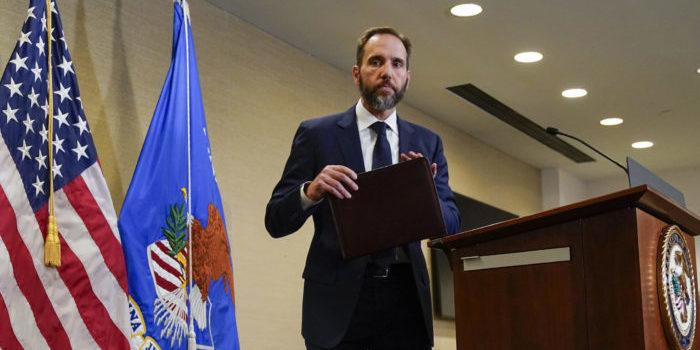(Ben Sellers, Headline USA) In an explosive two-page order late Monday ostensibly linked to jury instructions, Florida Judge Aileen Cannon gave dubiously appointed Justice Department special counsel Jack Smith a Hobson’s choice:
To assure that former President Donald Trump is afforded due process under the extraordinary and unprecedented circumstances for which Smith is attempting to prosecute him, either a jury must be able to have access to all of the classified documents that Trump is accused of mishandling, and thus to adjudicate whether he went beyond the scope of the Presidential Records Act; or, alternatively, according to the act itself, the discretion to make the determination as to what records are personal must fall on Trump himself.
“Although there is no formal means in the PRA by which a president is to make that categorization, an outgoing president’s decision to exclude what he/she considers to be personal records from presidential records transmitted to the National Archives and Records Administration constitutes a president’s categorization of those records as personal under the PRA,” Cannon wrote.
Cannon’s ruling was largely consistent with what Trump has long argued in his defense, and immediately triggered the anti-Trump partisans such as Andrew Weissmann, the former Mueller investigation stooge turned cable-news pundit, who unsurprisingly offered no pretense of impartiality.
Weissmann was left so stunned that he was at a loss for English words and resigned to speaking in Yiddish and legalese during a panel discussion on MSNBC.
“I have sort of two ‘M words’ for you: meshuggeneh, which is what this is because the choice that was given by Judge Cannon to the parties is to ask Jack Smith, ‘So please draft a jury instruction assuming that the Earth is flat.’ And the second one is ‘Please draft a jury instruction assuming that the Earth is square,'” Weissmann claimed.
“And so the second ‘M-word’ is mandamus,” he continued. “Mandamus is the ability to, um—it’s not an appeal, it’s, it’s for extraordinary actions by a district court that so clearly violate the law that you can appeal it right then and there.”
Weissmann clung to the hope that Cannon might be overruled at the next level above her, and that it would remain stalled there long enough to continue draining Trump’s financial resources and pulling him away from the campaign trail.
“It’s a very tough standard,” he said of the writ of mandamus. “But at this point, what she did today is so nutty, um, and so against, uh, … I really think, to the extent that you think she is engaging in partisanship, which I do, um, there really has to be a time that you take her up on it and you do this mandamus to get to the 11th Circuit.”
Some—including Weissmann—already speculated, however, that what seemed like a defeat last week in Cannon’s court for Trump may, in fact, have been part of a game of 3-d chess designed to keep the case at her level and prevent a later appeal from the prosecution by effectively putting the ball in Smith’s court.
Among those who predicted that Cannon would seek a dismissal on the basis of “selective prosecution” after last week’s hearing was investigative journalist Julie Kelly.
“Cannon won’t dismiss the case based on the motions debated today–vagueness of Espionage Act and protection under the Presidential Records Act,” Kelly tweeted on Thursday as part of a lengthy thread. “But it’s very likely she will dismiss the case based on selective prosecution, a motion still pending before her.”
NEW: From FLA courthouse in Trump's classified documents case with a prediction.
Robert Hur report and testimony is the biggest elephant in the room. The term "arbitrary enforcement" used frequently by both the defense and Judge Aileen Cannon.
Cannon hammered the fact no former…
— Julie Kelly 🇺🇸 (@julie_kelly2) March 14, 2024
On Monday night, Kelly further elaborated on her analysis that Cannon’s broader effort appeared to be forcing the DOJ prosecutors to define what constituted violations of the Espionage Act.
NEW: Judge Cannon continues to squeeze DOJ to define the vague terms in the Espionage Act. She just ordered Jack Smith and Team Trump to file proposed jury instructions by April 2 on how jurors should interpret "unauthorized possession" of national defense files.
She attempted… pic.twitter.com/54fbdvUbEC
— Julie Kelly 🇺🇸 (@julie_kelly2) March 18, 2024
It is a matter of central importance considering presidents Bill Clinton and Joe Biden, as well as Secretary of State Hillary Clinton, were all let off the hook for similar cases that involved mishandling of classified information—in some cases under circumstances far more egregious than Trump’s.
Smith is notorious for cases that are distinctly partisan and in which he is known for aggressivly overreaching beyond the scope of what the law permits to try to test the legal boundaries of what he can get away with.
He was previously smacked down by the U.S. Supreme Court in a bribery case involving former Virginia Gov. Bob McDonnell, but not before the negative headlines helped to flip Virginia blue for the next several election cycles.
Former Attorney General Ed Meese notably argued in a filing with the Supreme Court in December that current Attorney General Merrick Garland lacked the authority to appoint Smith as special counsel since he did not come from within the DOJ and was never vetted or confirmed by the U.S. Senate.
Ben Sellers is the editor of Headline USA. Follow him at twitter.com/realbensellers.

